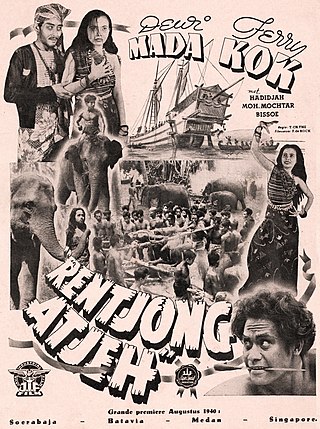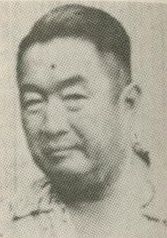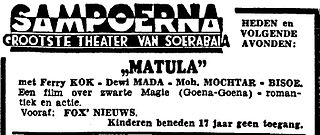
Fifi Young was an Indonesian actress of mixed French and Chinese descent who acted in at least 86 films over her 34-year career.

Kris Mataram is a 1940 film from the Dutch East Indies that was directed by Njoo Cheong Seng and starred Fifi Young and Omar Rodriga as two lovers divided by class. Young's feature film debut, the film was the first produced by Oriental Film and depended on Young's stardom as a stage actress to attract viewers. It may be a lost film.

Njoo Cheong Seng was a Chinese-Indonesian playwright and film director. Also known by the pen name Monsieur d'Amour, he wrote more than 200 short stories, novels, poems and stage plays during his career; he is also recorded as directing and/or writing eleven films. He married four times during his life and spent several years travelling throughout Southeast Asia and India with different theatre troupes. His stage plays are credited with revitalising theatre in the Indies.

Rentjong Atjeh is a 1940 action film from the Dutch East Indies directed by The Teng Chun. Telling of a group who take revenge against pirates in the Strait of Malacca, it starred Ferry Kock, Dewi Mada, Bissoe, Mohammad Mochtar, and Hadidjah. It was filmed near the shore in Batavia and reused footage from The's earlier work Alang-Alang (1939). Rentjong Atjeh, inspired in part by the Tarzan films, was a commercial success, although it may now be lost.

Fred Young was an ethnic Chinese film director and producer active in the Dutch East Indies and its successor state, Indonesia. He reportedly studied film in Hollywood as a youth, but only entered the nation's film industry in 1940. After he made his debut as a writer with Sorga Palsoe, he was involved in some 36 productions, 23 as director.
Tan Tjoei Hock was an Indonesian journalist and filmmaker. Born in Batavia, he was discovered by The Teng Chun in the late 1930s. Tan became one of the most productive film directors of the Dutch East Indies between 1940 and 1941, directing nine films – primarily action.
Boenga Roos dari Tjikembang is a 1931 film from the Dutch East Indies directed, produced, and filmed by The Teng Chun. Based on a 1927 novel of the same name, it follows the complicated romantic situations of two generations of ethnic Chinese in the Indies. An early example of domestic sound films, the film was remade in 1975.

Astaman also known as Tirtosari, was an Indonesian actor active from the 1910s until the mid-1970s. He was a leading actor in the influential theatre company Dardanella and, after entering the film industry with 1940s Kartinah, acted in 43 films.

Zoebaida is a 1940 film from the Dutch East Indies directed by Njoo Cheong Seng. A romance set in Timor, it starred Njoo's wife Fifi Young and was the film debut of Soerip. Shot over a period of 27 days in a Dutch-owned studio, the film received middling reviews. It is likely lost.

Air Mata Iboe is a 1941 drama film from the Dutch East Indies directed and written by Njoo Cheong Seng. Starring Fifi Young, Rd Ismail, Ali Sarosa, and Ali Joego, it followed a mother who raises her children lovingly but is ultimately betrayed by her eldest sons when she falls upon hard times. The film, billed as a "musical extravaganza," featured a soundtrack by R. Koesbini, and an eponymous title song written by Njoo.

Panggilan Darah is a 1941 film from the Dutch East Indies written and directed by Sutan Usman Karim and produced by Tjho Seng Han for Oriental Film. The black-and-white film starred Dhalia and Soerip as orphaned sisters trying to make a living in the colonial capital of Batavia before moving to Kudus to work at a clove cigarette factory.
Poetri Rimba is a 1941 film from the Dutch East Indies which was directed by Inoe Perbatasari and produced by The Teng Chun for Jacatra Film. A love story, it tells of a man who rescues a woman from a gang of thieves and escapes through the jungle.
Elang Darat is a 1941 film from the Dutch East Indies which was directed by Inoe Perbatasari and produced by The Teng Chun for Jacatra Film. A detective film, it follows a man who comes to a village to track the villainous bandit known only as "Elang Darat".

Matula is a 1941 film from the Dutch East Indies which was directed by Tan Tjoei Hock and produced by The Teng Chun of Java Industrial Film. The black-and-white film, now likely lost, follows a young man who tries to give a woman's soul to a shaman as payment for being made handsome.

Melati van Agam is a 1940 romance film directed by Tan Tjoei Hock and produced by The Teng Chun. Starring S. Soekarti and A.B. Rachman, the film follows young lovers named Norma and Idrus. The film may be lost.

Anastasya Soerip was an Indonesian singer and actress.
Gadis jang Terdjoeal is a c. 1937 film from the Dutch East Indies. It was directed by The Teng Chun, his first film to recognise native interests.

Pantjawarna is a 1941 film from the Dutch East Indies.

Oriental Film was a film production company in Batavia, Dutch East Indies. Established by ethnic Chinese businessman Tjo Seng Han in 1940, it completed four black-and-white films before it was closed in 1941. All the company's films were screened into the 1950s but may now be lost. They were directed by two men, Njoo Cheong Seng and Sutan Usman Karim, and launched the careers of actors such as Dhalia and Soerip.














